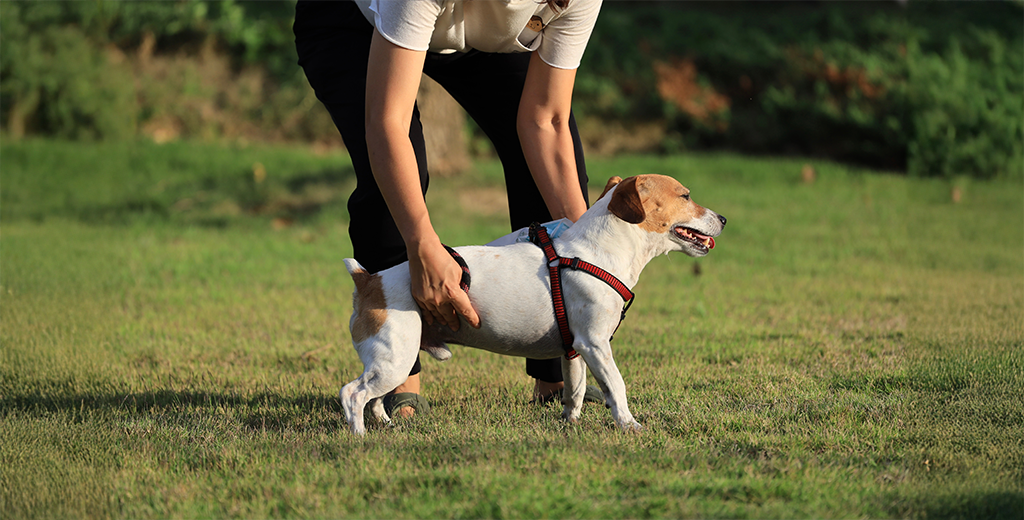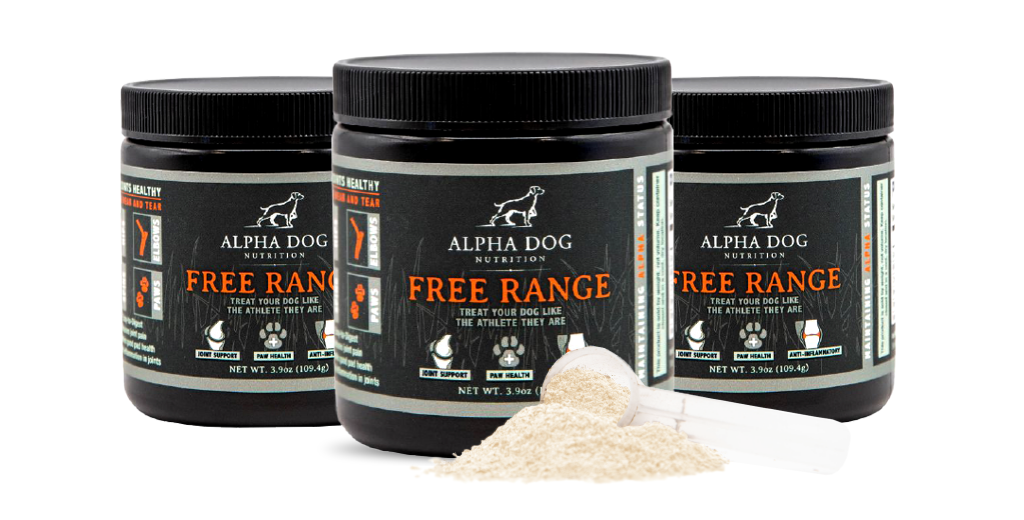If your dog has sore joints, you’re not alone. As dogs age, their joints can begin to show signs of wear and tear. Whether it’s due to arthritis, an injury, or just the natural process of aging, sore joints can affect your dog’s quality of life. But don’t worry—there’s good news. With the right care and attention, you can help your dog live more comfortably and move around with ease.
In this guide, we’ll explain why your dog might have sore joints, how you can recognize the signs, and the steps you can take to help them feel better. Plus, we’ll introduce you to a product that could make a big difference in your dog’s comfort: Free Range.

What Causes Sore Joints in Dogs?
Sore joints in dogs are usually caused by a few different factors, but the most common reason is arthritis. Just like in people, arthritis is a condition where the cartilage that cushions the joints starts to wear down, leading to pain, stiffness, and swelling.
Here are some of the most common causes of sore joints in dogs:
- Arthritis: This is the leading cause of joint pain in older dogs. It’s a progressive disease that can affect any joint in the body, but the hips, knees, and elbows are the most common areas.
- Injury: If your dog has suffered an injury to a joint in the past, even if it’s healed, it could cause chronic soreness and discomfort.
- Hip Dysplasia: This is a genetic condition, particularly common in large breeds like German Shepherds and Labrador Retrievers. It’s where the hip joint doesn’t develop properly, leading to instability and pain.
- Overweight: Carrying excess weight puts added strain on your dog’s joints. This can cause inflammation, pain, and accelerate the progression of arthritis.
- Age: As dogs age, their bodies naturally undergo changes. The cartilage in their joints breaks down over time, leading to stiffness and pain.
- Genetics: Some dog breeds are more prone to joint problems, especially larger breeds or those with shorter limbs.
Signs Your Dog Has Sore Joints
Knowing the signs of sore joints in your dog can help you catch the problem early and take action before it becomes a more serious issue. Here are some common signs that your dog might have sore joints:
- Limping or Favoring One Leg: If your dog is limping or seems to avoid putting weight on one leg, it’s likely due to joint pain.
- Stiffness: After resting, your dog may take longer to get up and start moving. They might stretch more or walk slowly, as their joints are stiff.
- Reluctance to Exercise: If your dog is no longer as excited to go for walks or play, it could be because it’s painful for them.
- Behavior Changes: Dogs in pain often become irritable or withdraw from social interactions. They may seem more sensitive when touched or handle their discomfort by barking more or hiding.
- Swollen or Warm Joints: If you notice any swelling or heat in your dog’s joints, that could be a sign of inflammation or arthritis.
If your dog is showing any of these signs, it’s important to see a veterinarian for a proper diagnosis. They can help determine the cause and severity of the problem and guide you on the best treatment options.

How to Help Your Dog with Sore Joints
There are several ways you can help relieve your dog’s joint pain and improve their quality of life. The right treatment will depend on the cause of your dog’s sore joints, but here are some general approaches that can help.
1. Maintain a Healthy Weight
If your dog is overweight, it can make their joint pain worse. Extra pounds put more strain on their joints, leading to more inflammation and discomfort. By keeping your dog at a healthy weight, you can reduce the pressure on their joints and help them move more easily.
Ask your vet for advice on your dog’s ideal weight and make adjustments to their diet and exercise routine if needed.
2. Gentle Exercise
While your dog may be reluctant to exercise, it’s important to keep them moving. Low-impact activities like short walks or swimming are great options because they provide exercise without putting too much stress on the joints. Always consult your vet before starting a new exercise routine for your dog.
3. Joint Supplements
One of the most effective ways to support your dog’s joints is with the right supplements. Joint health supplements can help reduce inflammation, improve mobility, and slow the progression of arthritis.
Free Range’s Joint Support Supplement is specifically formulated to help dogs with sore joints. Packed with natural ingredients like glucosamine, chondroitin, and MSM, these supplements work together to support cartilage repair, reduce inflammation, and improve overall joint function.
4. Heat and Cold Therapy
Applying a warm compress to your dog’s sore joints can help relax the muscles and increase blood flow to the area. On the other hand, a cold compress can reduce inflammation and numb the pain. These therapies can be used in combination to give your dog the most relief.
5. Veterinary Treatments
For more severe cases, your vet may recommend other treatments like physical therapy, acupuncture, or even joint injections. They might also prescribe pain medications to manage discomfort and inflammation.

What is Free Range Joint Support and How Can It Help Your Dog?
If your dog has sore joints, Free Range’s Joint Support Supplement can be a game-changer. This natural supplement is designed to address the root causes of joint pain and provide long-term relief.
Key Benefits of Free Range Joint Support Supplement:
- Reduces Inflammation: Chronic inflammation is one of the leading causes of joint pain. Free Range’s formula contains ingredients like turmeric and MSM, which are known for their anti-inflammatory properties.
- Supports Cartilage Health: Glucosamine and chondroitin are both essential for cartilage repair. These ingredients help rebuild damaged cartilage, reduce pain, and improve joint function.
- Improves Mobility: Many dogs with joint pain experience stiffness that makes it hard for them to move freely. Free Range can help reduce that stiffness and improve your dog’s mobility, so they can enjoy their walks and playtime again.
- Natural Ingredients: Free Range’s Joint Support Supplement is made with high-quality, natural ingredients. This means you don’t have to worry about harmful chemicals or artificial additives that can sometimes be found in other supplements.
- Easy to Administer: These supplements come in a tasty chewable form, making it easy for your dog to take them. No more fighting with your dog to swallow a pill!
By adding Free Range Joint Support Supplement to your dog’s daily routine, you can help them feel more comfortable and improve their quality of life.

Other Ways to Support Your Dog’s Joint Health
While supplements like Free Range are a great option for supporting your dog’s joints, there are other steps you can take to make sure your dog’s joints stay healthy for years to come:
- Regular Vet Check-ups: Your vet can monitor your dog’s joint health and make recommendations based on their condition. They may suggest x-rays or other diagnostic tests to get a better picture of how your dog’s joints are functioning.
- Orthopedic Dog Bed: A supportive dog bed can help alleviate joint pain while your dog is resting. Look for beds with memory foam or other cushioning materials to support your dog’s joints properly.
- Mobility Aids: If your dog has trouble climbing stairs or jumping, you can use ramps, stairs, or harnesses to help them move around more easily.
Conclusion: Relief for Sore Joints is Possible!
If your dog has sore joints, there’s no need to worry. With the right care, including maintaining a healthy weight, providing gentle exercise, and adding joint supplements like Free Range, you can help your dog live a happier, more comfortable life.
Don’t let joint pain limit your dog’s happiness. Invest in their health today with Free Range Joint Support Supplement and watch them regain their comfort and mobility.



